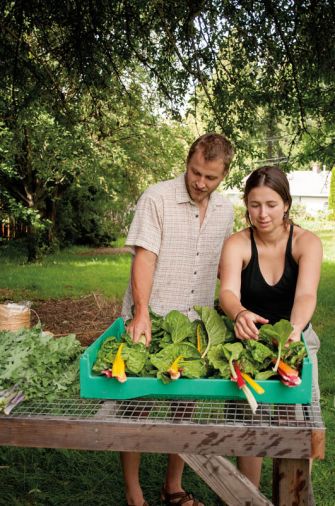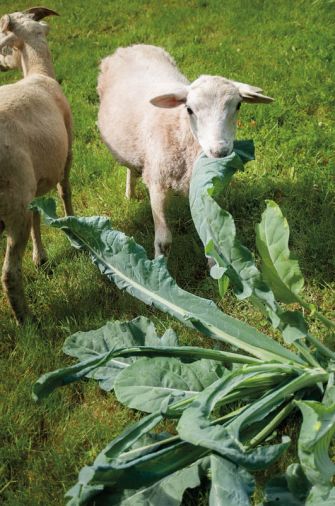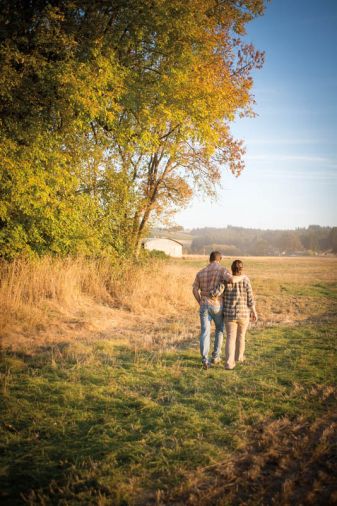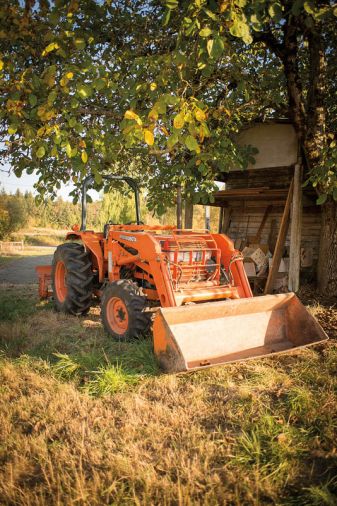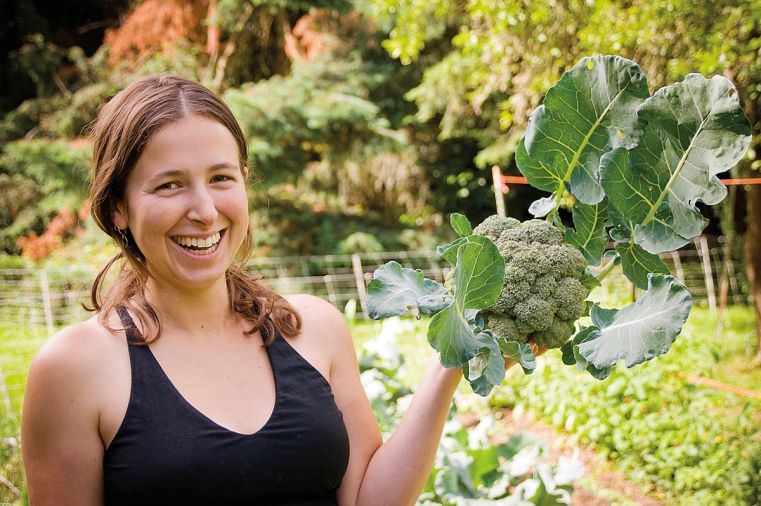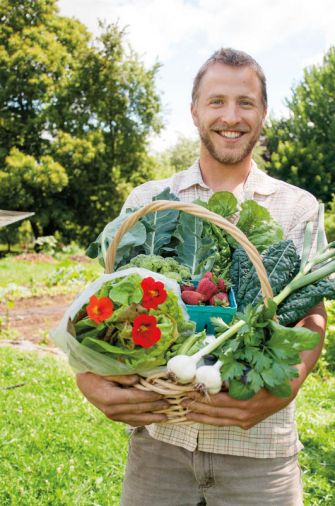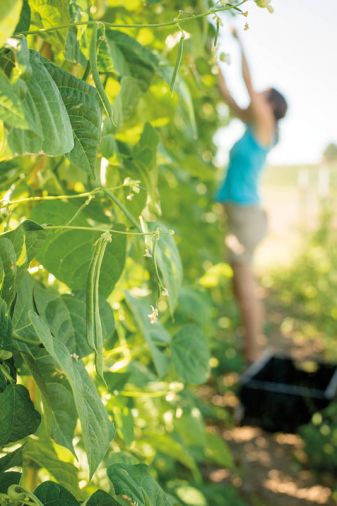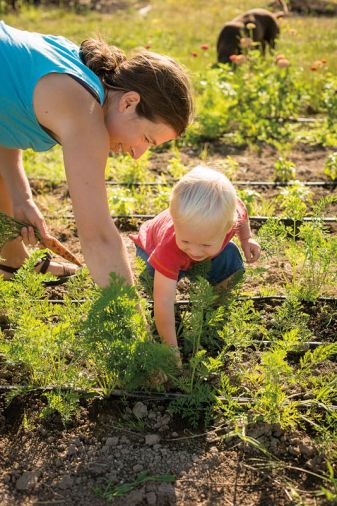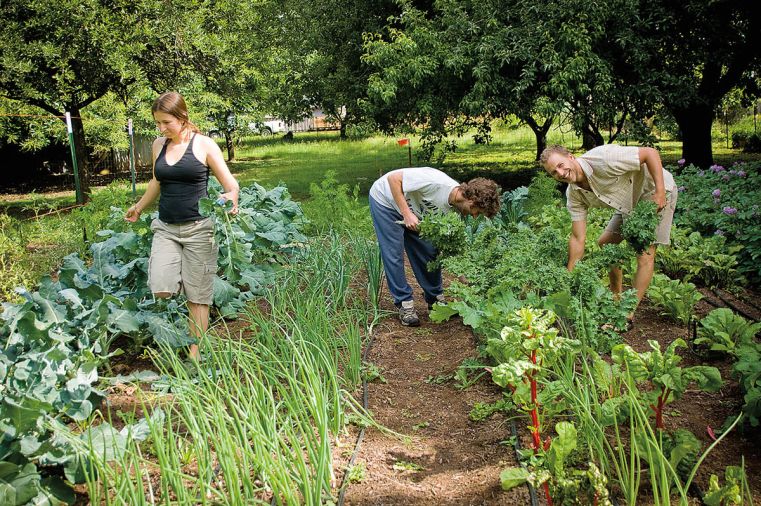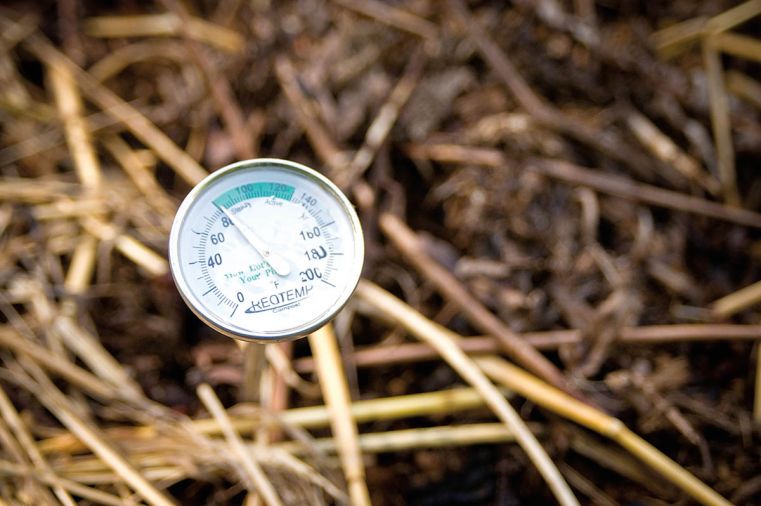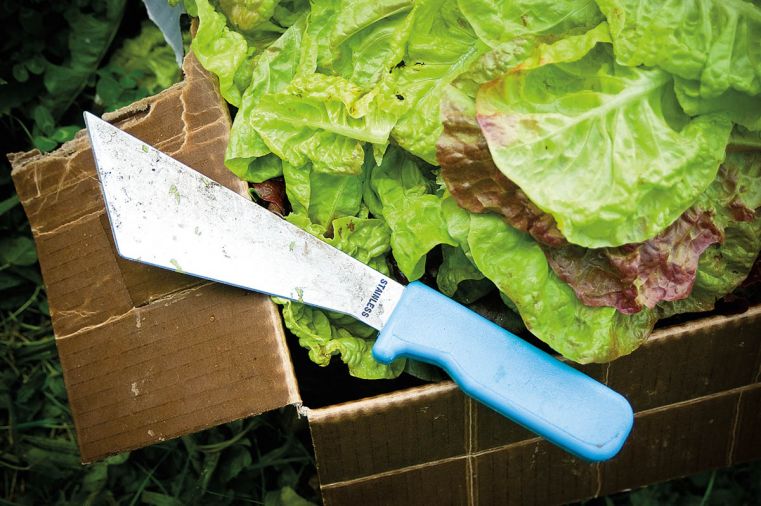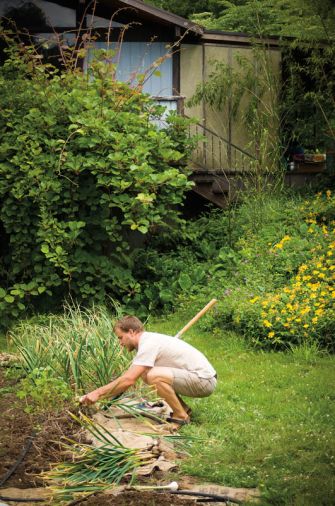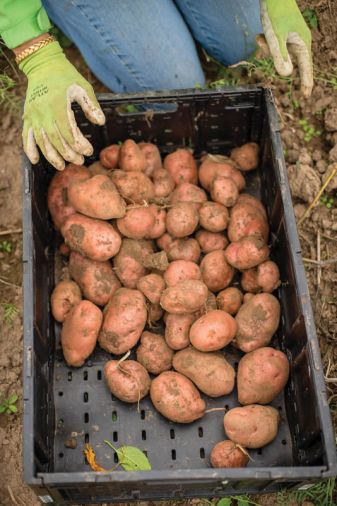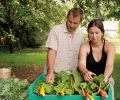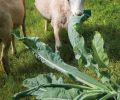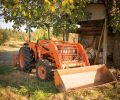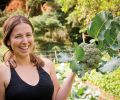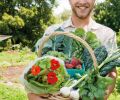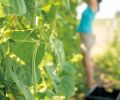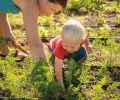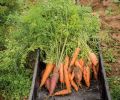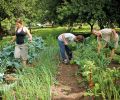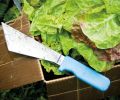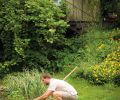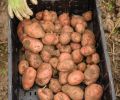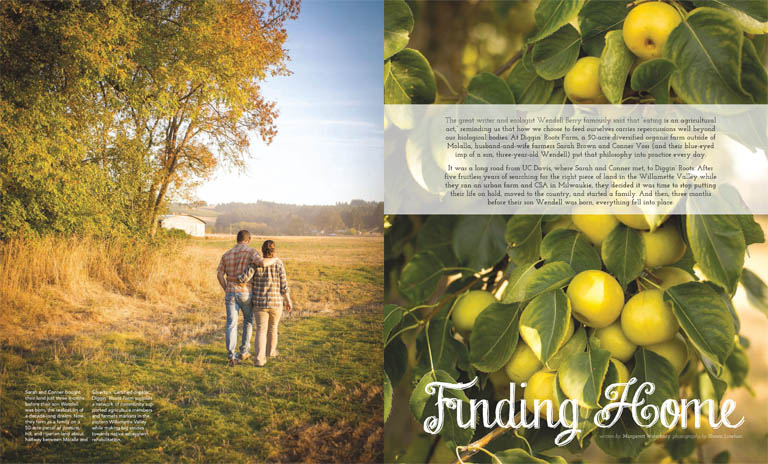Tell me about the early days of Diggin’ Roots Farm.
This is season three on this piece of land. After five years of making offers and not finding anything, we put everything in storage and moved out into the country. We felt like we needed to get out of the city and hopefully that would help us find a place. And then we got pregnant. It was kind of a blessing in disguise because it forced us to figure it out: we purchased a place in August of 2012.
There was a lot of work to do on the house, so we moved in in November and had our son Wendell in December. The day after our stuff arrived at the house, before we’d even unpacked our boxes, there are pictures of me, crazy pregnant, bundled up outside putting our first crop in the ground: garlic.
It was hard for both of us. We never ever envisioned that being the timeline of events. In the perfect world, we would have been on the farm for a few years, had the infrastructure and markets dialed in, and then had a kid. But that’s not how it happened. And now the farm and our family are evolving together. The systems that we build are built around us as a family, and we wouldn’t change that for the world.
What crops do you grow and how do you select them?
We try to grow a little bit of everything: broccoli, lettuce, kale, cabbage, green beans, cucumbers, a little bit of sweet corn, all that stuff. We love growing melons and we really like growing sweet onions.
We put a lot of intention and thought into the varieties we grow. There are hundreds and hundreds, if not thousands, of varieties of every vegetable you see at the store. We’re Certified Organic, so we need to prioritize organic seed. Then it’s really important to us that we’re getting varieties that are regionally appropriate and selected for our climates. We do that primarily by buying from local seed companies, like Adaptive Seeds and Uprising Organics. We like getting open pollinated seeds so we can save seed ourselves. By doing that, we’re prioritizing qualities like flavor, color, and aesthetics. It also feels good to protect a seed system that is more open source and in the long run is going to be more sustainable and diverse.
I know you put substantial energy into cultivating non-agricultural spaces on your land. Can you talk a bit about the role of native greenbelts on a farm?
That was one thing we did not want to compromise on. We wanted 30-70 acres so we could practice really long rotations between vegetables, soil building crops, and pasture, which help with soil fertility and breaking pest cycles. You need a lot of space to do that. We also wanted something with some topography and texture. Diggin’ Roots has some small hills and four acres of riparian area that was completely overgrown with invasive blackberry when we got here. We have been working with the conservation district to clean that up and replant natives. In the three years we’ve been here, it’s been so cool to watch the life come back into the land. Now we have three resident herons in the field, raptors, birds of prey, snakes and frogs on the cropland. That’s been really rewarding.
There was a study recently that said Portland is one of the major urban areas in the United States that could feed all its residents with local food. What do you see as the role of local agriculture today?
It’s so important to remember that eating does not just impact the crop and the field where the food is grown. It also impacts the surrounding natural area, the economics of that community, the farmworkers, and the health of neighbors. Taking a bigger view of how our actions ripple out into culture and society is important, and food is a great place to start that conversation because it’s so easy to connect to.
At the same time, we aren’t totally self-sufficient. We still go to the grocery store, we buy grains, we buy avocados. There’s room for big farms too and I think supporting them in implementing organic and sustainable farming practices is really important.
What’s some advice you’d give to people who want to start buying local produce?
Know your farmer. I don’t think that can be understated. There is so much that goes into bringing the green beans to your plate. I think really getting to the root of what your farmer’s values are and making sure they resonate with you is critical.
I also think it’s important to understand the costs for small farmers. Sometimes we get feedback at market that prices are too expensive, but we drove those crops here in a car with 300,000 miles on it. We’re not getting rich farming; those prices represent a lot of work. Your farmer needs to figure out what seed company to buy from based on how the seed was grown and whether the fertility to grow them will be local or imported. Then you plant the seed, dig up and transplant each individual, weeding, harvesting, curing, packing. Each individual onion is handled probably six times. When you think about thousands of onions, it really adds up. At market, there’s not always enough time to have that conversation, but we believe that organic certification is one quick and easy way of making the statement that there’s a big story behind food and the choices we make.
What’s it like to have a toddler on the farm?
It’s so cool, because he is so into it and so self-sufficient. He’s referring to himself in the third person right now. The other day he said “Wendell doesn’t work” and we said “Yes you do!” and we listed off all the things he does. He will just walk out the door and be in the raspberry patch picking berries. He knows more about vegetables than the average grown-up. He loves all the activity, watching guys on tractors, helping with projects dad is working on, he even loves to cook and show people around. Now he calls himself a farmer.
How do you imagine Diggin’ Roots in 10 years?
Number one priority, we’d really like to be farming together full time. My off-farm job is awesome, but we want to be a family farm. As much as we like farming, we also just like working together. We definitely want to have many more animals, more perennials, and we haven’t planted an orchard yet but we’d love to do that. One of our main goals is to have a committed and connected group of customers and farm members who are part of our CSA and really into the long-term vision of the farm. Yes, we are providing food and vegetables, but by being a member of our farm you’re supporting much more than that. We really look forward to cultivating that community and making people feel like it’s their farm and they’re contributing to building resilience.
LOCAL CSAs
47th Avenue Farm
Grows 200+ crops at Portland farm, offers summer and winter shares, full and half size. Pickup in Woodstock and Lake Oswego at Luscher Farm. 47thavefarm.com
Sauvie Island Organics
Founded in 1996, grows 40+ crops on Sauvie Island, all 100% organic. Pick up throughout Portland, June to mid-December. 500 members and restaurant clients. sauvieislandorganics.com
Tumbleweed Farm
In Parkdale, offers shares from June through October, with pickup at farm, Hood River Farmers Market or Migration Brewing in NE Portland. Owner Andrea Bemis blogs about farm life at dishingupthedirt.com, gotumbleweed.com
Hood River Organics
Cooperative CSA with fully customizable boxes. Options include produce, mushrooms, bread, eggs, honey and coffee. Full and half shares, 52 weeks. Doorstep delivery or pickup throughout Portland. hoodriverorganic.com
Pumpkin Ridge Gardens
Operating since 1990, from foothills of Oregon Coast Range. Specializes in vegetables, flowers & pastured eggs. Year-round delivery and pickup throughout Portland region. PumpkinRidgeGardens.com
Zenger Farm
Educational farm in SE Portland. 23 weeks of vegetables and one package of beans or grains from Bob’s Red Mill. Farm or Lents Farmers Market pickup. www.zengerfarm.org
Diggin’ Roots Farm
In Molalla, offers 20-week season with pickup at farm and in SE Portland. Full and partial shares, with option to add lamb, pork, turkey, flowers, bread and cheese. digginrootsfarm.com
Moomaw Family Farm
Grass-fed meat CSA. Offers pork, chicken, lamb and rabbit, all pasture-raised raised in Oregon City. Full shares delivered monthly, half shares delivered every other month. moomawfarm.com
KooKoolanFarms
Offers 18 weeks of vegetables in three share sizes.
Pick up at Yamhill farm. Also sells chicken, lamb, pork and beef shares. Meadery on site. Kookoolanfarms

